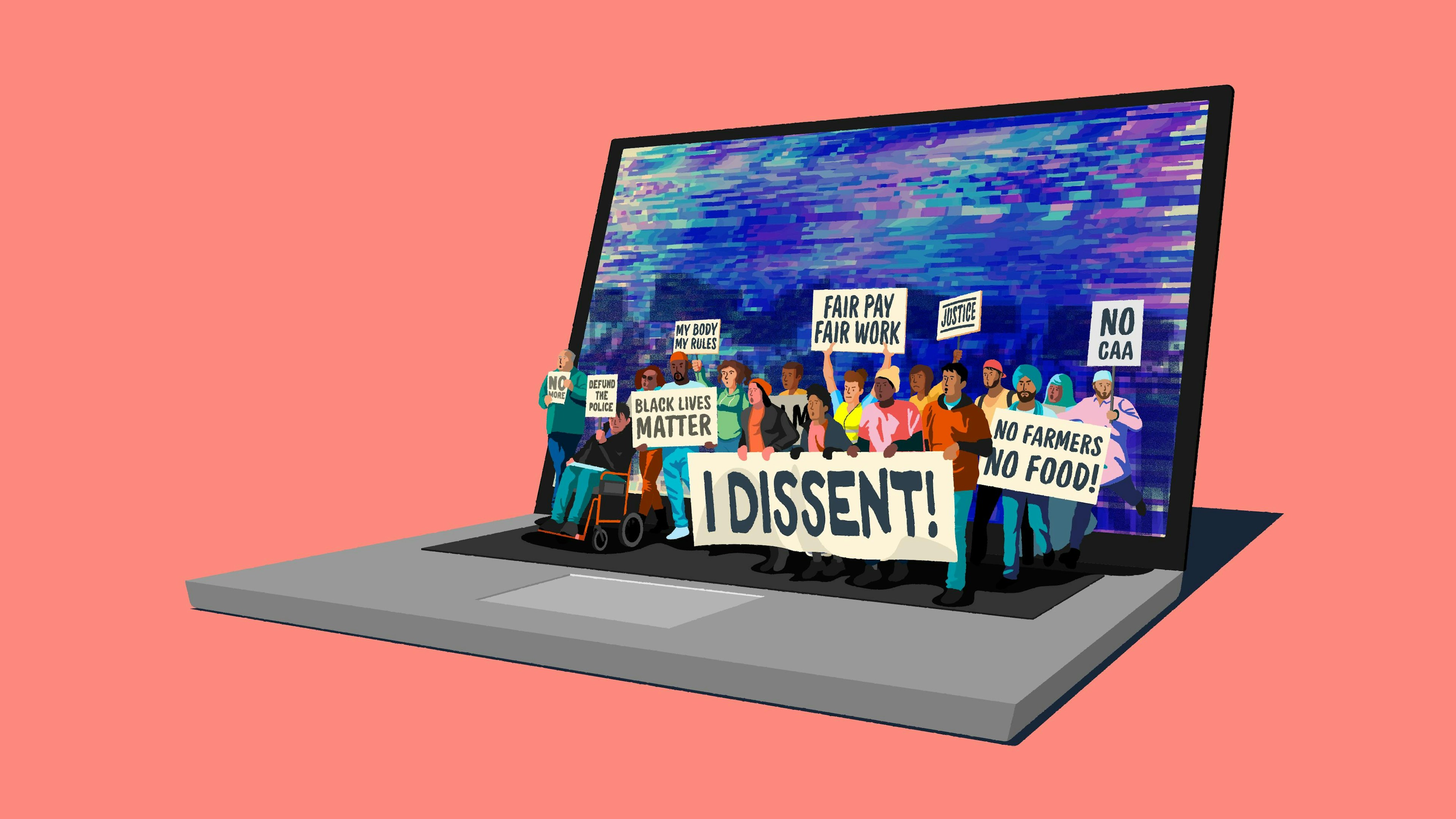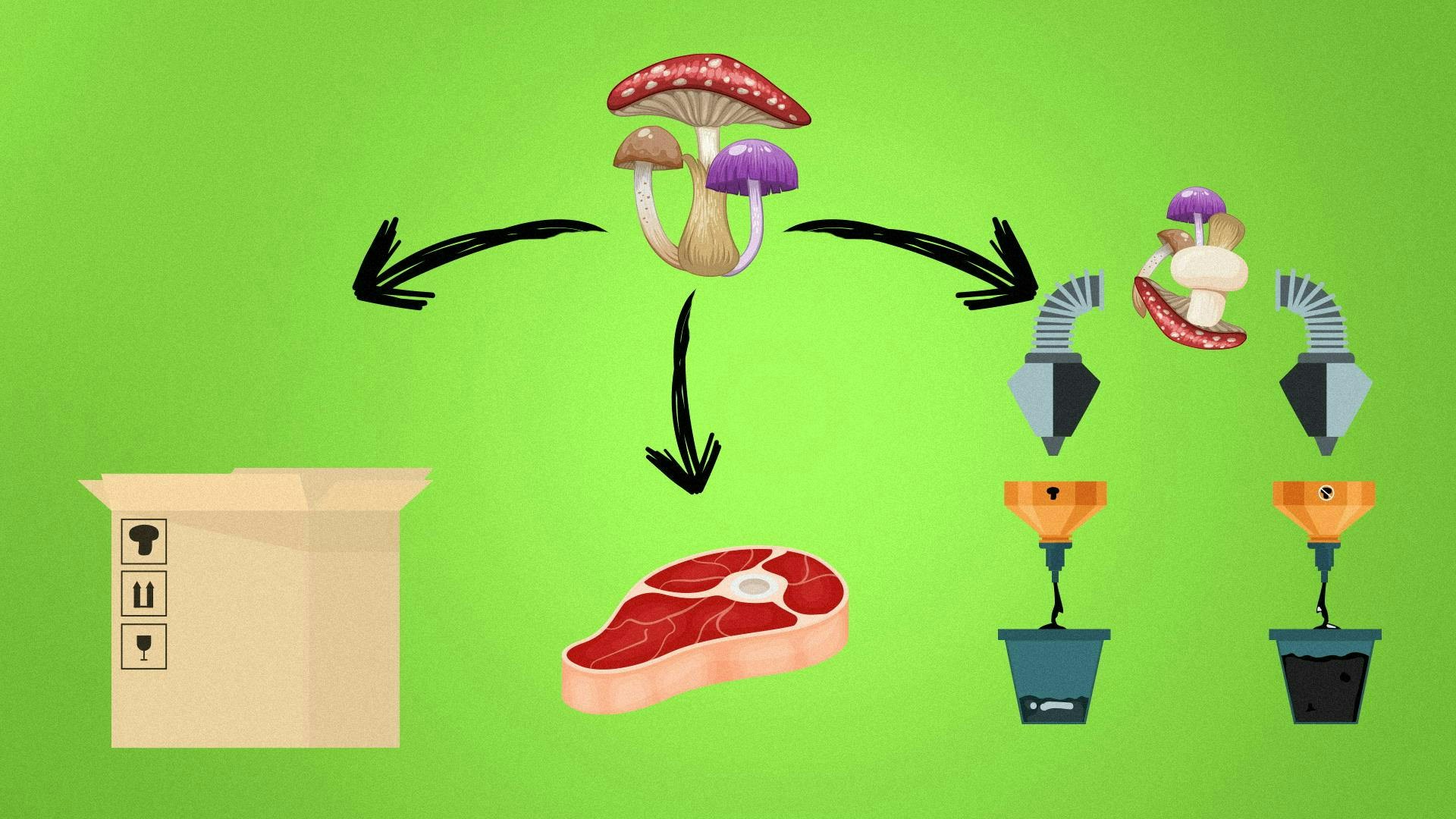Giorgio Tarraf wants to give the future-focused a sense of wonder

Giorgio Tarraf is the Technology Intelligence Director at L’Atelier BNP Paribas. He’s been with the company since 2019, helping spearhead investigations of emerging technologies.
Gio’s passion for technology—and its ability to shape society—is obvious to anyone who’s read T+10, a weekly newsletter on how tech impacts the world. Neither a utopian daydreamer nor a hardened cynic, his humour and curiosity shine through in every issue. (He also pens Insights' Tech Briefings.)
Gio sat down with us to give a behind-the-scenes look at his process for creating T+10, and what he hopes you’ll get from reading it. The following interview, conducted by agency Grey Horse, was edited for clarity.
Your newsletter, T+10, explores how tech transforms our lives. Out of all the subjects in the universe, why did you choose this one?
Technology is the one measurable thing that can transform us. There are other things, like philosophy or meditation, that have changed societies and civilisations in significant ways, but you can’t measure those.
The other aspect is that technology is really what enables us to be who we are right now, as humans. And it’s changing so quickly—and in ways that are sometimes very unpredictable. So it was important for me, on a personal level, to get my own sense of self for facing the future. What is ahead, and how can we prepare? Can we hedge against risk? Can we see an opportunity?
These are questions that I’ve always cared about, even at a young age, which naturally led me towards technology.
Are you coming from a place of general optimism, pessimism, or some blend depending on the circumstances?
“Cautious optimism” is my favorite phrase. I think coming in with an open mind is crucial. You’ll notice in the newsletter that I come from a place of science: I’ll read the press and look at different sources, but in the end I always go back to the scientific paper or original code, just to make sure I’m capturing the authentic spirit of what I’m discussing.
From there, I decide whether I can be optimistic about the topic. And if I’m not, I try to identify why. That’s why sometimes, in the second half of these short paragraphs that I write, I’ll say, “Hey, maybe we should consider this, or take another look at that.” There are often other issues at play. And it’s difficult sometimes to be optimistic when you’re looking at things like bias in AI—this is something I’m deeply concerned about.
But I try to never stop there. I try to envision parameters we can set in order to fix these issues. The newsletter is meant to open a conversation about the solutions.
To me, tech is inevitable. It’s unstoppable. Governments and civilisations can say, “We don’t want this technology.” But in the end, history shows that technology always wins.
We might as well observe it, understand it, and learn how to make it work for us as humans (rather than becoming subservient to it).
What ideas, people, and/or principles have influenced your thinking?
The word “transformation” is a powerful one. And technology exemplifies that, right? It’s unbelievable to me that there are generations that didn’t have computers. Whenever I think about that, I wonder, “Why do I want to live so long? Why do humans have this obsession with living for a long time?” And often, for me, the answer is: Because I’m curious.
I really want to know what the technology of the future is going to look like. That’s what we should always be trying to do, to push the boundaries. How much can I see? How much can I foresee? What can I guess? What can I learn? What is the science actually doing right now?
It’s just natural curiosity, and I think my readers share this.
The term “tech” is quite broad. Do you tend to focus on any particular types of technology?
The way we use the word “technology” is definitely broad, but to me it means a very specific thing: the application of science for a practical purpose.
My favorite thing to look at is emerging technology. For me, it has to be innovative. It can’t just be an improvement of an existing solution, it has to actually be something new. And it has to be deployed within the next decade—it has to have a near-term impact on business or society (ideally both). It also has to give, let’s say, a competitive advantage.
To me, these are the most interesting technologies to study. So I’m always trying to find examples that are going to redefine our understanding of our relationship to machines and to each other.
When choosing your topics for a given week, how do you decide what to include (and, perhaps more importantly, leave out)?
I used to put this disclaimer at the beginning of the newsletter (and recently brought it back by popular demand): “I spend too much time on the internet so you don’t have to.” There’s definitely a subjective aspect to what I write about—even though it’s not an opinion newsletter, there’s a lot of myself in it.
I want to show you the real science behind the technology, and the real discourse that’s happening around the technology based on the facts. My favourite thing to do is to identify topics that are underreported, or poorly reported, by the media. When I find these things, it’s an opportunity to learn and hopefully to teach … well, teach is a bit presumptuous, but maybe at least to open up a conversation about what is actually happening.
For example, take bias in AI. Can we change it? Is it fundamentally embedded in the technology, or is it something we can work on and set boundaries for?
The other type of questions that I like to address are the big, difficult ones. I only have a few lines to answer them, but that’s part of the challenge, and I enjoy it. One of my personal pet peeves is poorly-reported science news. I’m not saying that all science reporting is bad, but when it happens this is a strong signal that I should be talking about the topic. I want to at least give an alternative view that is based on the source of the information, rather than a desire for clicks.
Can you share an example of a recent tech-driven transformation you think deserves more attention?
One of my favourite technologies is brain-connected interfaces—types of machines that can regulate our brain signals into computer signals, and sometimes vice versa. This is an increasingly common phenomenon, and to me it’s a fundamental shift in the way we interact with silicon.
When you connect your meat brain to your silicon brain, we see a transformation in the level of intimacy we have with technology.
That raises a lot of questions, including ethical ones. Am I still in control of my thoughts? Am I changing the way I think in order for the machine to understand me? Are we going to start prosecuting thought crimes? These are all questions that might come to the forefront sooner than we think.
We see some companies doing work with brain-connected interfaces, and they get a lot of press. But in fact, the research that is happening now at universities around the world is more advanced than what we’re seeing on flashy stages. That’s something I’m really curious about. I’m also mindful about the possible negative impact, and that’s something we should probably examine very early on so we can avoid it.
But overall, I think this technology is wonderful. If you’re able to have a brain-to-brain conversation, I think we could communicate ideas in ways that are more real. We can develop more relationships, whether we’re in the metaverse or in meatspace. It doesn’t matter—we’d actually be able to communicate in new ways with each other and with our machines.
I also think augmented reality (AR) is interesting. To be fair, the way we talk about it is becoming gimmicky. But the only thing holding it back right now is hardware development and our willingness to embrace it.
I really like thinking about how this technology might be implemented, because we know we already have the tech to do it. We have self-driving cars, we have AR on our phones. But what we don’t have yet is a willingness to accept wearing cameras on our faces. This is a really interesting technology for me, because it’s one of the few that’s being held back by popular will. Or a certain sense of unease. I wonder what companies are going to do to break this suspicion and generate the trust needed for AR to reach its full potential.
Who’s your audience for T+10? Who do you have in mind when putting stories together?
It’s for people who are concerned about the future. I think there’s a general sense of anxiety about the future, and it’s not necessarily unfounded. We’re at the cusp of a fundamental transformation, whether it happens through the metaverse, or another technology, or some combination of technologies.
There will be significant shifts again, and again, and again. So my newsletter is really addressed to people who are willing to adapt, or at least curious about how to adapt.
I want to reach people who are willing to look at things with an open mind, rather than through pre-packaged opinions. Of course, there might always be a bias in the selections I make, or the way I write things. I acknowledge that and try to be mindful about it. But I also try to offer facts and balanced information so people walk away with an inkling of their own opinion.
What kind of reaction would you like to spark in your readers?
Curiosity. And, if I’m very lucky, wonder.
I’m a child of the internet. I grew up with it, and it influenced me for better or worse. I was lucky to have access to a computer when I was young, growing up in a country where not everyone had access to computers or the internet.
I had the dial-up modem and I would spend hours on there just being curious about the world. I’d be, like, “Wow! You can see all of this information!” The exploration that the internet allows is unprecedented. I was lucky to be born at a time where we were transitioning from the pre-internet era—one day I’m pulling information from books or people nearby, then suddenly everything changed because of this bulky grey machine.
I was able to see things in action, to see photos that weren’t in Encyclopaedia Britannica or on my Encarta CD. And that’s what really started my desire to explore. I don’t take for granted the things that technology now offers.
Reader interaction: are you in favor of it? And, if it is permitted, how might someone get in touch with you?
If people are interested in the topics, and they have things to add, of course they can get in touch. But the most interesting reader interaction, for me, is between them and the material and their environment.
My goal here is for the reader to look at what I’ve written, and to spark an idea or opinion or debate. I hope they can take this information forward with them, in their work or just their own personal development.
17 Feb 2022
-
Angela Natividad
Illustration by Paula Dixon.
DATA-DRIVEN TECH & SOCIAL TRENDS. DISCOVERED WEEKLY. DELIVERED TO YOUR INBOX.
02/03
Related Insights
03/03
L’Atelier is a data intelligence company based in Paris.
We use advanced machine learning and generative AI to identify emerging technologies and analyse their impact on countries, companies, and capital.


